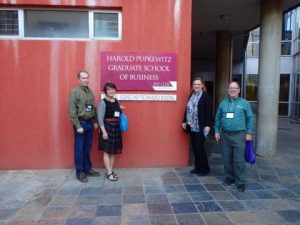One of the purposes of the FDIB trips is to facilitate cooperation between faculty, not just those on the trips, but with members of universities in host countries. Today, in compliance with that goal, we had visits at two of the top universities in Namibia (I think there are three).
The first was the Windhoek campus of the University of Namibia, and I confess I’ve never really had a comparable site visit. Usually, we have something of an overview, then usually a question and answer, then some sort of a reception where we can talk one on one. At U Namibia, however, the dean of the school of business launched into a “here’s how you can help us.” Piecing things together, it sounds like the University has too many students (200 MBAs, 26 PhDs) and too few faculty (one full time because hiring full-time faculty is too expensive!). As a consequence he was looking for research supervisors and thesis examiners, since all advanced degrees require a research thesis. He pointed to the opportunities for co-publication and collaboration. His college does hire many adjuncts from both business and the academy, but they cannot both supervise and examine. This was the biggest of the 12 regional campuses of the university.

The second visit was to the Namibia University of Science and Technology, a more established Management Institute for graduate business education.The school coaxed a 10 million Namibian donation from a local businessman (divide by 15 to see how much you’d have to pay in US dollars to get the school named after you). The school is housed in the university, but it specializes in graduate (and executive) education. It, too, has a small faculty (6) and a large adjunct supplement. What I found interesting was that the six do not include either an accountant or a marketer, though in talking with the faculty afterwards, they do bring in faculty from the undergraduate departments, including marketing and accounting. The dean of the total area told me over half of the students at the university came under his care, and the head of the graduate school suggested—only half-jokingly, I think–that we ought to leave a resume with him!
Some other things that came out of the meetings:
Many of the students in graduate business are government employees (expected, this is the capital). All at NUST are part time.
The dean at NUST said that one of the emphases of the school was on improving business in Namibia. One is tourism, the largest business after mining and fishing. He mentioned that Namibia is virtually unknown in the US and Australia, two countries which send a lot of tourists overseas, and they are complementary in having summer six months apart!
He did mention that his school hosted a “customer service” seminar that was pan-African, hoping to identify where Africans can use the fundamentals that have been established in services marketing in the US and the Nordic countries over the past thirty years. That led to some discussions about our experiences in sub Saharan Africa, both good and bad. I had an episode where I asked a policeman in Swakopmund to point me in the direction of our hotel which also housed a casino, and he replied that he’d been on the force for only two days (which said he wasn’t from the town and wasn’t trained). In response to our wondering why the mall below our hotel closes at 6, he noted downtown (where we are) closes down and people go back to the suburbs, which stay open till 11. Thinking about Chicago, it’s about the same in most central business districts.
I had a little time to wander, but I think I’ll save that for another post—and that’s when I’ll tell you what’s at the corner of Fidel Castro street and Luderitz Strasse (no kidding!)